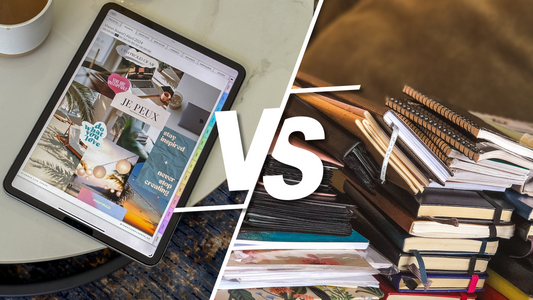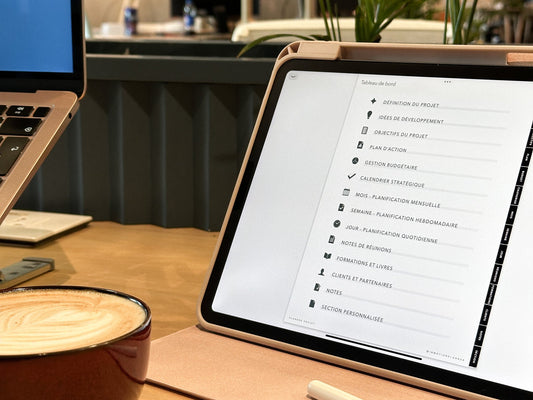
Digital planner or Notion: which tool should you choose to stay better organized?
Share
Are you looking for an effective way to organize your daily life, manage your tasks, and structure your ideas? Digital tools today offer powerful solutions to boost your productivity and simplify your time management. Among them, the digital planner and Notion are two popular alternatives. But which one is right for you?
The digital planner mimics the paper experience while offering digital flexibility, while Notion presents itself as an all-in-one platform for organizing both your professional and personal life. Rather than pitting these two tools against each other, let's explore their pros and cons to better understand how to use them.
Digital Planner and Notion: definitions and key uses
The digital planner: an interactive digital notebook
A digital planner is an interactive agenda designed for use on tablets with apps like Goodnotes, Notability, or Noteshelf . It has the look and feel of a paper planner, with hyperlinks for easy navigation between pages and sections. It allows you to take handwritten notes, highlight, add stickers, and fully customize the organizational experience.
Concept: a modular workspace
Notion is a no-code productivity app that combines note-taking, project management, and database functionality. It works on the block principle: each element (task, note, table, checklist, etc.) can be modified and moved at will. Used by both individuals and businesses, Notion allows you to create a personalized and ultra-flexible workspace . Its biggest advantage? Its ability to structure large amounts of information in a visual and connected way.

The advantages and disadvantages of the digital planner
The digital planner is a modern alternative to the paper agenda, combining the flexibility of digital technology with the joy of handwritten organization. It appeals to those seeking visual and interactive planning, but it also has certain limitations. Let's take a look at its main advantages and challenges.
Its strengths:
-
An immersive writing experience
The digital planner allows you to rediscover the pleasure of writing by hand while enjoying the benefits of digital technology . Handwriting promotes memorization and reflection, and offers a more intuitive approach to planning. -
A visually engaging tool
Thanks to integrated hyperlinks, digital stickers, and customizable templates, the digital planner offers a more enjoyable and engaging experience. It inspires creativity in organizing your days. -
Total flexibility
Unlike paper, it has no page limits and can be edited at will. You can add sections, rearrange your priorities, and easily find your old notes using the search options.
Its challenges:
-
Tablet and Stylus Addiction
To fully enjoy a digital planner, you'll need a tablet and a compatible stylus. This represents a significant initial cost compared to a simple paper notebook. -
Less integration with other tools
Unlike Notion, a digital planner remains a personal and static planning tool. It doesn't allow you to automate certain tasks or collaborate with other people. -
Can become time-consuming
With all the customization options available, it's easy to spend more time beautifying your planner than actually organizing your days.

The Pros and Cons of Notion
Notion has established itself as a must-have productivity tool thanks to its flexibility and extensive features. It's ideal for structuring complex information and collaborating effectively, but it can also present some adaptation challenges. Let's examine its strengths and limitations.
Its strong points:
-
An ultra-flexible organization
Notion adapts to every need. Whether you want to manage a project, track your finances, or organize your notes, you can create custom dashboards and databases. -
Seamless integration with other tools
It allows you to import documents, integrate links and synchronize information with third-party applications (Google Calendar, Slack, Trello, etc.), making information management more fluid. -
A powerful collaborative tool
Unlike a digital planner, Notion is ideal for teamwork. It allows you to share notes, assign tasks, and track project progress in real time. -
Accessible on all devices
Whether you're on a computer, tablet, or smartphone, your data is always accessible, and everything syncs automatically.
Its limits:
-
Getting started takes time
Notion is extremely flexible, but this flexibility can also be a hindrance at first. It takes time to properly organize your space and master all the features. -
Less intuitive for handwritten note taking
Unlike the digital planner, Notion doesn't allow handwriting. Those who prefer a handwritten approach might find it less natural. -
Dependence on an internet connection
Notion works primarily online. While it has an offline mode, it's limited and can be problematic if you need to access your information offline.
How to combine digital planner and Notion for optimal organization?
Rather than choosing between these two tools, why not use them together to take advantage of their respective strengths?
Using the digital planner for creative planning
- Take handwritten notes and structure your days.
- Track your habits, goals and personal priorities.
- Create an inspiring visual space for better motivation.
Using Notion for collaborative tracking
- Centralize your professional and personal information.
- Track complex projects with dynamic databases.
- Automate certain tasks and collaborate with other people.
By combining the two, you benefit from more intuitive, intentional, and immersive planning with the digital planner, while having a structured and interactive space with Notion to manage more complex projects.

The digital planner and Notion aren't rivals, but complementary allies. The former offers a sensory and intuitive experience, ideal for personal reflection and daily planning. The latter allows for in-depth and interactive organization, perfect for structuring projects and teamwork.
If you enjoy writing and organizing your daily life creatively, a digital planner is a great choice. If you need a structured and collaborative space, Notion will be your best ally. And if you want the best of both worlds, the ideal solution is to combine them for a smooth and efficient organization!
Join our community of passionate organizers and share your best tips for boosting your productivity.
Don't miss any tips! Subscribe to our newsletter and receive exclusive tips to optimize your time management and achieve your goals with peace of mind.
Ready to choose the perfect digital planner for your organization? Visit the InMotion Planner store to discover our dated, undated, and specialized templates, designed to help you structure your daily life and achieve your goals with clarity and motivation.








